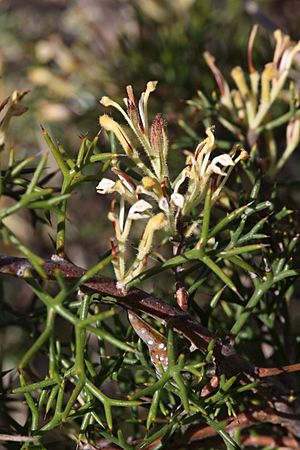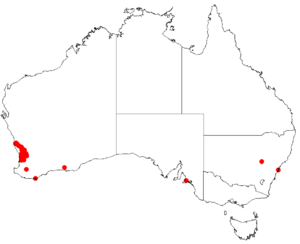Hedgehog or porcupine hakea facts for kids
Quick facts for kids Hedgehog hakea |
|
|---|---|
 |
|
| Hakea erinacea at John Forrest National Park, Western Australia | |
| Scientific classification |
|
| Kingdom: | Plantae |
| Clade: | Tracheophytes |
| Clade: | Angiosperms |
| Clade: | Eudicots |
| Order: | Proteales |
| Family: | Proteaceae |
| Genus: | Hakea |
| Species: |
H. erinacea
|
| Binomial name | |
| Hakea erinacea Meisn.
|
|
 |
|
| Occurrence data from AVH | |
| Script error: The function "autoWithCaption" does not exist. | |
Script error: No such module "Check for conflicting parameters".
The Hakea erinacea, often called the Hedgehog Hakea or Porcupine Hakea, is a unique shrub. It belongs to the Proteaceae plant family. You can only find this plant in the southwest part of Western Australia.
Contents
What Does Hedgehog Hakea Look Like?
The Hedgehog Hakea grows upright and can reach over 1.5 meters (about 5 feet) tall. It can also spread out to be about the same width. Its leaves are short, spiky, and round like a pencil.
Flowers and Fruit
This plant produces beautiful flowers between May and November. The flowers are usually creamy white. They have red or purple parts called pistils. After the flowers, small, smooth fruits grow. These fruits are narrow and curved, ending in a short pointed tip. Unlike some other Hakea plants, the Hedgehog Hakea drops its seeds when they are ready.
How Hedgehog Hakea Got Its Name
The Hakea erinacea was first officially described in 1845. A scientist named Carl Meisner gave it its name. The word erinacea comes from a Latin word meaning "hedgehog." This name was chosen because the plant's leaves are very spiky, just like a hedgehog's quills!
Where Hedgehog Hakea Lives
You can find the Hedgehog Hakea growing in specific areas of Western Australia. It prefers sandy soil mixed with clay or gravel. It grows on the coastal plains and in the Darling Ranges, which are located north of Perth.
Is Hedgehog Hakea Endangered?
The government of Western Australia keeps track of plants to see if they are at risk. Currently, the Hedgehog Hakea is listed as "not threatened." This means it is not in danger of disappearing.
 | Ernest Everett Just |
 | Mary Jackson |
 | Emmett Chappelle |
 | Marie Maynard Daly |

